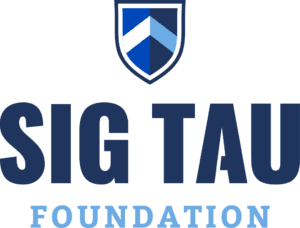Delta Pi Chapter
University of Pittsburgh at Johnstown
About the Chapter
The Delta Pi Chapter of Sigma Tau Gamma at the University of Pittsburgh at Johnstown in Johnstown, Pennsylvania was originally established in 1988 with 28 Founding Fathers. It was re-established in 2009 with 16 Refounding Fathers. Over 300 men have been initiated since its inception.
Fun Facts
- Currently, the largest chapter of any fraternity on campus
- Has a brotherhood of diverse academic endeavors, such as Electrical and Civil Engineering, Accounting, Marketing and Management, Criminal Justice, Biochemistry, Psychology, Information Systems, and Computer Programming
- Received the Mountain Cat Organization of the Year award in 2015 from the University of Pittsburgh at Johnstown
- Has won Greek week four times
Chapter History
The current Delta Pi Chapter of Sigma Tau Gamma was founded in 2007, and chartered in 2009. With 16 Founding Fathers, the chapter was born anew at the University of Pittsburgh at Johnstown campus within the Briar Four Lodge, which has housed brothers since the late 1980’s. The Delta Pi Chapter has been known for its membership, at one time having over 40 active brothers.
The Delta Pi Chapter has a rich history of leadership at the collegiate level and beyond, and have prided themselves on the development of well-polished leadership principles. These principles are routinely instilled in members as they complete the Path of Principles Associate Member process. Brother Nate Eicholtz, while serving as Chapter President, recently lead the Delta Pi Chapter to win the Mountain Cat Organization of the Year Award, while distinguished brother, Matt Ziance, has made considerable headway in life after college as a successful social media professional working for NBC.
Since the Delta Pi Chapter is youthful in years at the University of Pittsburgh at Johnstown campus, the history is continuing to unfold before; which is perhaps the most exciting part of being a brother at the Delta Pi Chapter. Just within the 2016-2017 year, the Delta Pi Chapter has been a major factor in the “rebranding” efforts of Greek life on campus in an attempt to dispel common misconceptions about being in Greek life and beginning to foster an environment for students that is more academically friendly and network-oriented.
Chapter Funds
A Chapter Fund is a restricted account from the Sigma Tau Gamma Foundation. In this case, the restriction is that the funds and earnings on the investment of the funds may be used only for a particular chapter, meaning that if you donate to your chapter’s fund, it may only be used for your chapter.
Chapter Funds may be used to:
- Award scholarships based on academic and leadership criteria

- Technology grants for purchase and upgrade of chapter computer technology
- Educational facility grants to the selected chapter
- Leadership education grants for participation in institutes, seminars, and conventions.
The Foundation manages the fund. This management includes fund accounting, investing, and preparing required reports for the Internal Revenue Service. The policy of the Foundation Board of Trustees is to involve chapter alumni association leaders in the creation of criteria, formation of program priorities and selection of grant recipients.
Submitting Changes to the Chapter’s History
Any member of the fraternity and/or chapter is welcome to submit a request to update/change/correct information listed within the chapter history portion of the page. submissions will be accepted in two ways: should a correction need to be made, please submit the entire sentence/paragraph, that needs to be updated with the correction highlighted in yellow or in a different color. If something new or updated needs to be added, please submit the entire text that needs to be added and/or revised with the new information highlighted in yellow.
This information should be submitted to noblemen@sigtau.org, where is will be reviewed by HQ Staff. Your submission will not be acknowledged unless it has been added to the website. It is very important that the chapter’s history accurately and objectively reflects the chapter, so all corrections, additions, and revisions should be reviewed by other members of your chapter before being submitted.